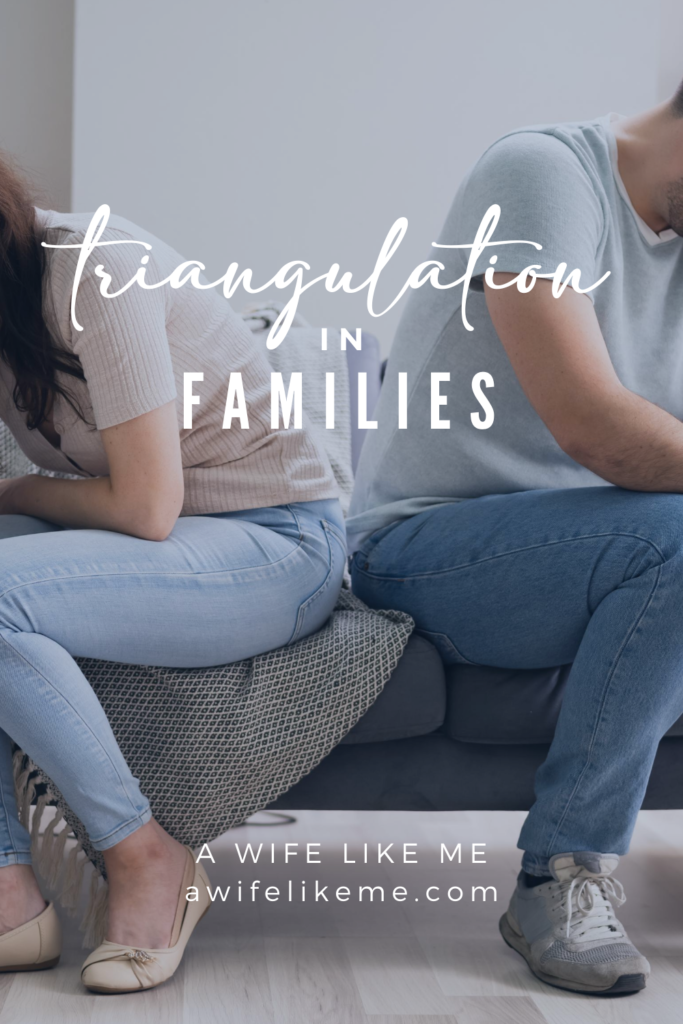What is triangulation, and how does it make things worse in your relationships? Let me explain.
My husband planned to give each of our daughters a sum of cash to help them buy a house when it was the right time. This has always been important to him and a part of his drive to work hard even past the age where he should have retired.
This is an awesome blessing to our girls, but it doesn’t come without strings. The first is that they must be ready to own a home and be able to maintain it. The second is that he must approve of the house and the terms.
One of my daughters was looking at buying a home. She told me she wasn’t sure she wanted to take her dad up on his offer. Why? Because he wasn’t easy to deal with. He is a great man, but he can be strong, opinionated, blunt, harsh and unreasonable.
I told her, “If it isn’t worth dealing with him to get the money he has set aside for you, then don’t. But if you want it, you will have to work it out between you two. I am not getting involved.”
This was a new stance for me. Even when the girls were adults, I usually had some involvement by giving my input to them, their dad or both.
If your experience is a home where the dad was reasonable, you are probably shocked by me saying that. But if you’ve had a home where the dad was unreasonable, harsh or irrational, you get it.
My Response
I often jumped in to try to reason with my husband on our daughter’s behalf, as children and adults, by telling him what he was doing wrong – which only made things worse with them and made him mad at me.
When he didn’t change, I usually tried to talk to the girls to get them to change what they were doing. I wanted them to respond to him in a way that didn’t make things worse, but they only saw me as defending what he was doing and got mad at me.
This is called triangulation. It is where one person enters into a relationship between two other people. As a wife and parent, when brought into triangulations we will often try to fix what is going on. By doing this, the rescuer (me) makes one of the two the persecutor and the other the victim.
What does this do? It prevents the two people from working out their problems. When one recognizes that the third party, the rescuer, sees them as a victim, they are emboldened and don’t look at themselves. The other person, the persecutor, recognizes there is two against one and becomes angrier and more resistant. It also increases marital conflict when wives insert themselves into relationship problems that would otherwise not be their issues.
This is clearly dysfunctional and unhealthy and should only be done when victims are truly unable to stand up for themselves.
Looking back, I needed to intervene with some of his interactions with the girls because some were clearly over the line and not healthy. But doing it the way I did wasn’t healthy either. If what he was doing was abusive and damaging, I needed to set boundaries.
My daughter and her dad worked it out. She bought the house she wanted with his blessing. Not triangulating gave them an opportunity to work together which improved their relationship. And it was wonderful for me because I didn’t have to stress about any of it and neither one could blame me for their decision.
Wife Step: Are you triangulating in any of your husband’s relationships? If you are, make a plan to stop triangulating.

Karla Downing, the founder of ChangeMyRelationship.com, offers Christian marriage help and Christian relationship help as a speaker, author, counselor, and Bible study teacher. Karla grew up in a dysfunctional family and then found herself struggling with Christian codependency in her own difficult marriage. Through her personal struggles, she discovered biblical and practical principles, which she now teaches to others. She also trains counselors, pastors, women’s ministry leaders, church leaders, small-group leaders, non-profit ministry leaders, and individuals to minister to Christians in difficult relationships. Karla’s passion is to see individuals, marriages, and families set free from the chains of dysfunction, misunderstanding, and emotional pain through a correct understanding of what the Bible teaches about relationships.
Karla Downing is the author of the Evangelical Christian Publishers Association 2004 Silver Medallion Award winner, 10 Lifesaving Principles for Women in Difficult Marriages. Her second book, When Love Hurts: 10 Principles to Transform Difficult Relationships, applies the same principles to all family members. Her third book, The Truth in the Mirror: A Guide to Healthy Self-Image, offers a unique and life-changing approach to looking at self-image.
She holds a Master of Arts in Marriage and Family Therapy from Hope International University. Karla also holds a Bachelor of Arts and Master of Arts in Communicative Disorders from California State University, Fullerton. She is a licensed Marriage and Family Therapist and a licensed Speech Language Pathologist. Karla was also the director of Friends in Recovery, a Christ-based, Twelve-Step recovery program.
Karla lives in Southern California. She has been married for over thirty years and has three adult daughters.
3 Comments
Submit a Comment


Thank you so much for posting this article. This was me for years when my kids were growing up (they are adults now). I have learned to step back and not be the mediator, let them move forward with my husband if/when they choose to, and have the conversations and relationship that they need to.
I am a child and family therapist, and it is so EASY for me to see this pattern at play in others’ families–and yet I still turn a blind eye to how I do the same. I turn to justification–if he would just be reasonable, or have a cooler head, or be more gentle…etc, then I wouldn’t NEED to get in the middle. But we know that families are systems in which each person’s actions affect everyone else’s…and maybe I am the one who needs to change first. Thank you for this well-written article!
Charla, thank you for your work as a therapist! If you ever have input for families here, email us at info@awifelikeme.com!